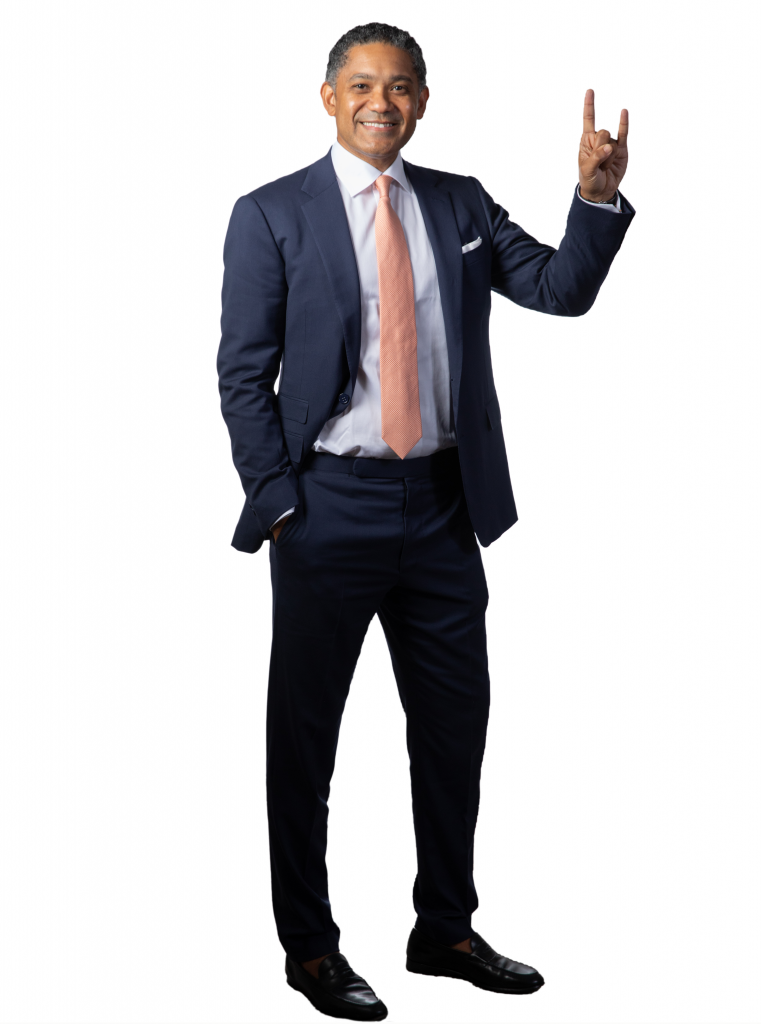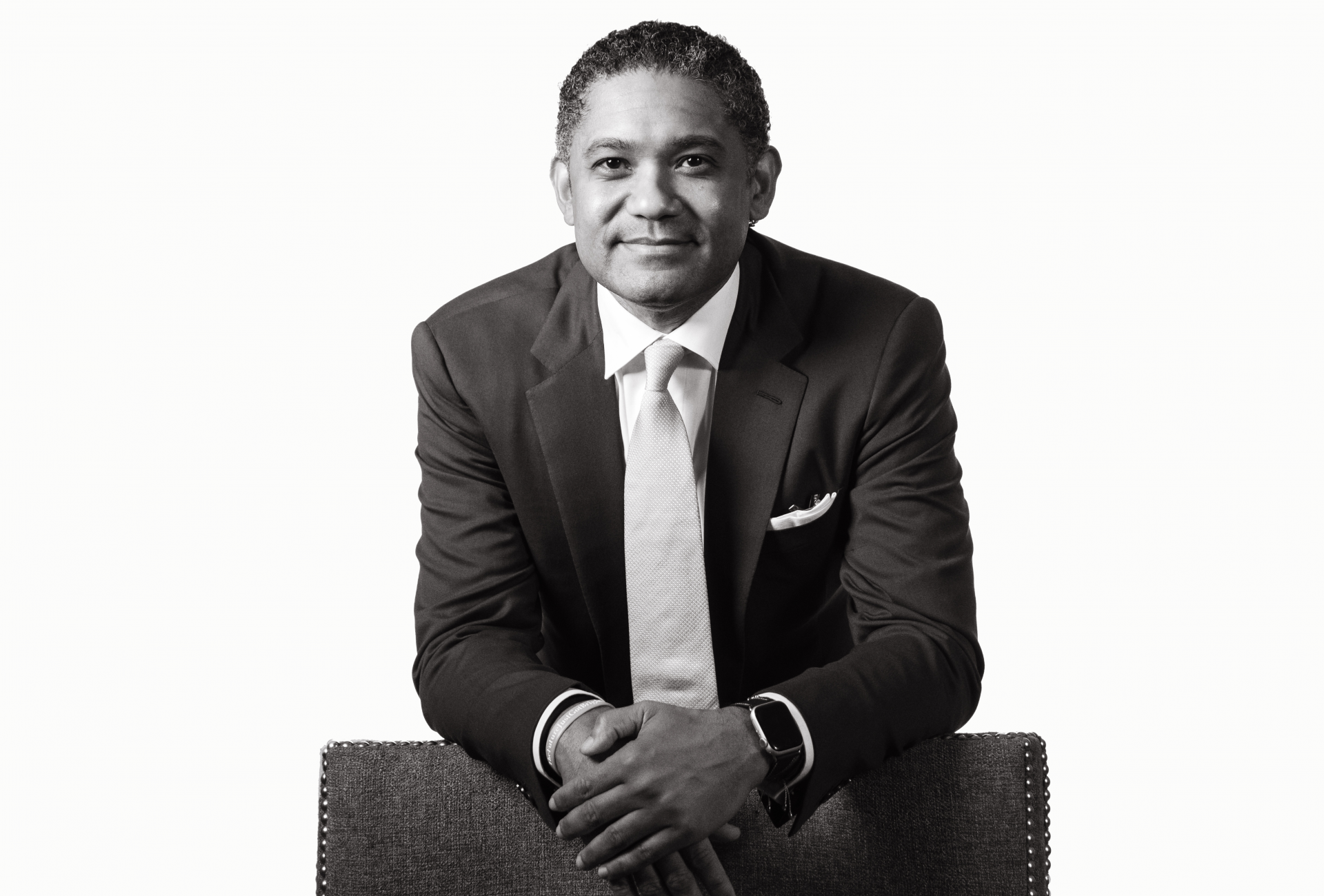Jason Lamin is the founder and CEO of Lenox Park Solutions. After beginning his career in investment banking, he helped launch a London-based start-up group for Merrill Lynch, and in 2008 he founded Nyawa Funding Group, a not-for-profit organization with a mission to improve living standards in Sierra Leone. Before founding Lenox Park, he was a director in Merrill Lynch’s Fixed Income Structured Credit group in New York. Lamin serves on the advisory boards for the Department of Economics and Black Studies at The University of Texas at Austin. He also serves as an independent board director for Harding, Loevner Funds, Inc. and the asset management advisory board for Paris-based Tikehau Capital.
Education: B.A. Economics ’98, The University of Texas at Austin
What’s your fondest memory during your time at UT Austin?
In 1994, the year after I enrolled at UT, my younger brother, Jeremy, also enrolled at UT. Jeremy and I grew up worshiping UT basketball, attending summer basketball camps at Gregory Gym and wearing all the burnt orange and Longhorn basketball gear we could get our hands on. So, when Jeremy was asked to join the UT Basketball team as a freshman walk-on, it was surreal. I have many fond memories of my time at UT, but it’s hard to beat that first home game of the season in November 1994 — there I was with my family, in the stands of the Frank Erwin Center, watching my brother run out onto the court, suited up in the Texas Runnin’ Horns basketball uniform with his horns up in the air! I was so proud (and I enjoyed the premium seat, too)!
What’s the best advice your mom (a fellow liberal arts alum) has offered you?
She’s given some great advice in almost all areas of my life over the years (and still does), but the area where the gravity of getting it right is matched with her super power has to be in parenting — and my brother and I would know because we’re beneficiaries. Parenting is simultaneously the most challenging and most rewarding thing that I do. The rewards are plenty, but it can be challenging for me because I’m naturally a long-term planner, and I tend to intricately analyze future scenarios.
Well, as any parent will acknowledge, this can be a curse if you’re trying to navigate parenting in 2020. I worry about everything: how to raise a strong, self-assured girl who’s also empathetic and compassionate; the long-term effects of so much technology on children; COVID-19; etc. But my mother has reminded me time and time again to stay in the present with my daughter, Raya; and to focus on the things that are in my control, and that if Raya is first and foremost loved and supported by her family, she’ll be just fine.
Want to share any special moments from being the college’s 2017 commencement speaker?
As proud as I was to be invited as commencement speaker at my college, I vastly underestimated how memorable and special it would be; and it will always be one of the greatest experiences of my life and an unforgettable honor. Every moment was truly special and fun, but two things come to mind. The first is that I took a ‘selfie’ while on stage! Yes, in front of about 8,000 people, I took a selfie… and among all those proud and wonderful 2017 graduates dressed in their caps and gowns, there in the front row was my family, including my daughter Raya, who was five years old at the time. And everyone with their horns up in the air! It was amazing.
The second special memory is the time I spent with graduates and their families after the ceremony, many of whom were immigrants, celebrating a first-generation college graduate. I left the venue full of gratitude that I was included in their stories; and a sense of pride in our university.
How do you apply your liberal arts education?
I’m obviously biased, but I truly believe that liberal arts degrees provide the precise types of education that can address the world’s most pressing challenges. In my case, the analytics that came with an economics degree combined with study of the humanities and language resulted in big-picture, non-linear thinking and problem-solving skills that have always served me well, especially as an entrepreneur.
How are you intentional about cultivating a culture that is inclusive?
Right now, our country is suffering deeply as it tries to reconcile with a history that is littered with brutal bigotry and racism; and while that history and the compounding effects etched into almost every system in our country today must be acknowledged, there is no place for it in our future. So, while all Americans should continue to uphold and pursue the dream of what America could become, we should also acknowledge that that dream will only materialize if it includes everyone. The ramifications of a society that systematically excludes groups of people can be devastating for all of us.
For me, being intentional about cultivating a culture of inclusion starts with introspection and humility. Once you realize that a multitude of perspectives within a team can lead to happier work environments, better performance and more creativity and innovation, it becomes one of the most important things you can do as the leader of a company.
I know that in order to create and sustain the right inclusive environment for diverse teams to thrive, I have to consistently monitor, hire and invest in our culture with that in mind. As I’ve built a team that also values inclusive cultures, it’s now second nature to all of us and we all feel immense pride knowing we have a firm where anyone can belong and bring their most authentic self to work.

If you could change one thing about the global economy, what would it be?
I’ve had the honor of working with the United Nations Global Compact over the past 10 years, covering a few of the Sustainable Development Goals now. One of the extraordinary benefits of this work is that it serves as a reminder that even though things don’t progress as quickly as we would like, there are some brilliant minds that are trying to tackle the world’s most pressing challenges and doing that while coordinating with unique agendas of over 190 nations can be challenging. I’m reenergized every time I have the pleasure of participating in the meetings and my faith in humanity is often renewed.
One of the drawbacks though, is that I often come face to face with issues that are devastating our world — climate change, hunger, poverty, gender and racial inequality, disease, etc. If I could change one thing about the global economy, it would be that all capital investments would be viewed through the lens of environment and social impact, and a realization that investing capital that has positive environment and social impact is not only the right thing to do, but it’s good long-term business.
Who inspires you?
It sounds cliché, but I have to say at this very moment, I’m incredibly inspired by the youth; and not just in America, but across the world. Watching people from all different races, genders, sexual orientations, veterans, disabled people… all unified by a sense of justice and protesting against systemic racism has been remarkably inspiring and left me more encouraged than I could have ever imagined.
The Pro Bene Meritis award is the highest honor bestowed by the College of Liberal Arts. Since 1984, the annual award has been given to alumni, faculty members and friends of the college who are committed to the liberal arts, have made outstanding contributions in professional or philanthropic pursuits or have participated in service related to the college.
